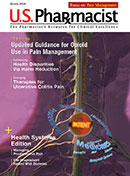COVID-19 vaccines provided to patients with some types of blood cancers might be less effective than in others, according to new reports.
Two new studies published in Blood suggest that the mRNA COVID-19 vaccine may have reduced efficacy in those diagnosed with chronic lymphocytic leukemia (CLL) and multiple myeloma. Carefully planning vaccine timing might help, the researchers explain.
The first study, led Tel Aviv Sourasky Medical Center in Israel, advises that CLL patients had significantly lower immune response rates to the two-dose mRNA COVID-19 vaccine than healthy individuals of the same age. Those patients also had lower antibody titers, which indicates lower intensity of the response.
The researchers explain that because clinical trials of these vaccines did not include patients with blood cancers, who are at high risk of severe illness and complications from the virus, it is especially important to determine the effectiveness of the vaccine in this population.
In the study of 167 patients with CLL, only four out of 10 (39.5%) had a positive antibody-mediated response to the vaccine; in the control group, all had a positive immune response. Responses by CLL patients varied, however, by where they were in their cancer treatment process, according to the report.
For example, the authors point out that patients undergoing active cancer treatment had significantly lower response rates versus patients who had completed treatment and were in remission, 16% versus 79%, respectively. Treatment-naïve patients had a 55.5% response rate, and the response to the vaccine was notably greater, 94%, in patients who completed CLL treatment at least a year before vaccination compared with those who were still in treatment within the last year, 50%.
“Overall, the response rate to the vaccine was significantly less than what we see in the general population, which is most likely attributed to the presence of cancer itself and certain CLL treatments,” said lead author of the study Yair Herishanu, MD. “It would seem that if you are untreated, in what we call ‘watch and wait’ or do not have active disease, you can gain more benefit from the vaccine. Patients who responded the best were in remission, which makes sense because their immune system had a chance to recover.”
Other factors predicting better vaccine response rates were younger age, being female, and having normal immunoglobin levels at the time of vaccination.
Little difference in response rates was found among common targeted therapies, including Bruton’s tyrosine kinase (BTK) inhibitors (ibrutinib or acalabrutinib) or a combination of venetoclax with anti-CD20 antibodies, such as rituximab. On the other hand, none of the patients who received anti-CD20 antibodies within 12 months of COVID-19 vaccination responded, according to the study. Because only five patients were on venetoclax monotherapy, Dr. Herishanu said they could not draw any conclusions about the impact on response.
“Even though response rates were not optimal, patients with CLL should still get the vaccine and, if appropriate, it may be better to do so before CLL treatment starts although the disease itself may affect the response,” Dr. Herishanu said.
A letter to the editor published online by the same journal includes information on vaccine response by elderly patients with multiple myeloma. Evangelos Terpos, MD, PhD, of the National and Kapodistrian University of Athens in Greece, and colleagues compared outcomes of 48 patients with multiple myeloma versus 104 healthy controls at Alexandra Hospital in Athens. On Day 22 after the first dose of the vaccine but before the second dose, antibody titers were measured, and the median response was 20.6% neutralizing antibodies for the multiple myeloma population as compared to 32.5% for the healthy controls. Participants’ median age was 83 years.
At the time of the first dose, 35 (72.9%) patients were receiving antimyeloma therapy, four were in remission after prior therapy and did not receive any therapy at the time of vaccination, and nine had smoldering (precancerous) myeloma. Researchers posit that antimyeloma therapy seems to negatively affect production of neutralizing antibodies after a single dose, but they caution that a larger study pool is necessary to further understand the effect. They also urged the administration of a second timely vaccine dose for elderly patients with multiple myeloma to develop an adequate antibody-based response.
The content contained in this article is for informational purposes only. The content is not intended to be a substitute for professional advice. Reliance on any information provided in this article is solely at your own risk.
Published April 30, 2021





